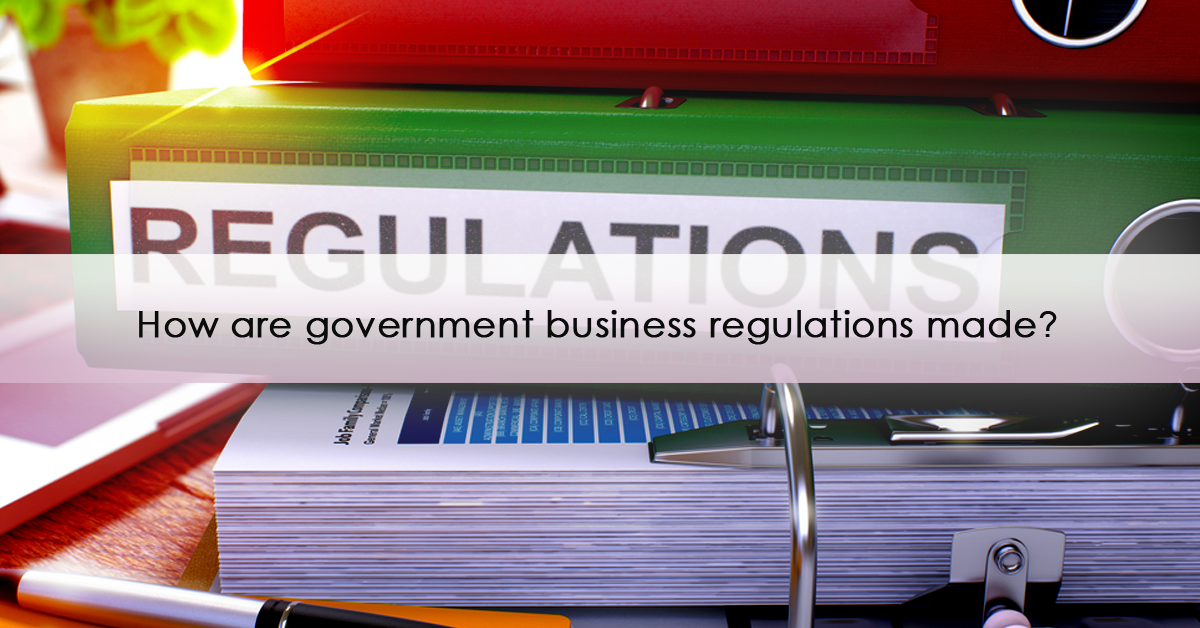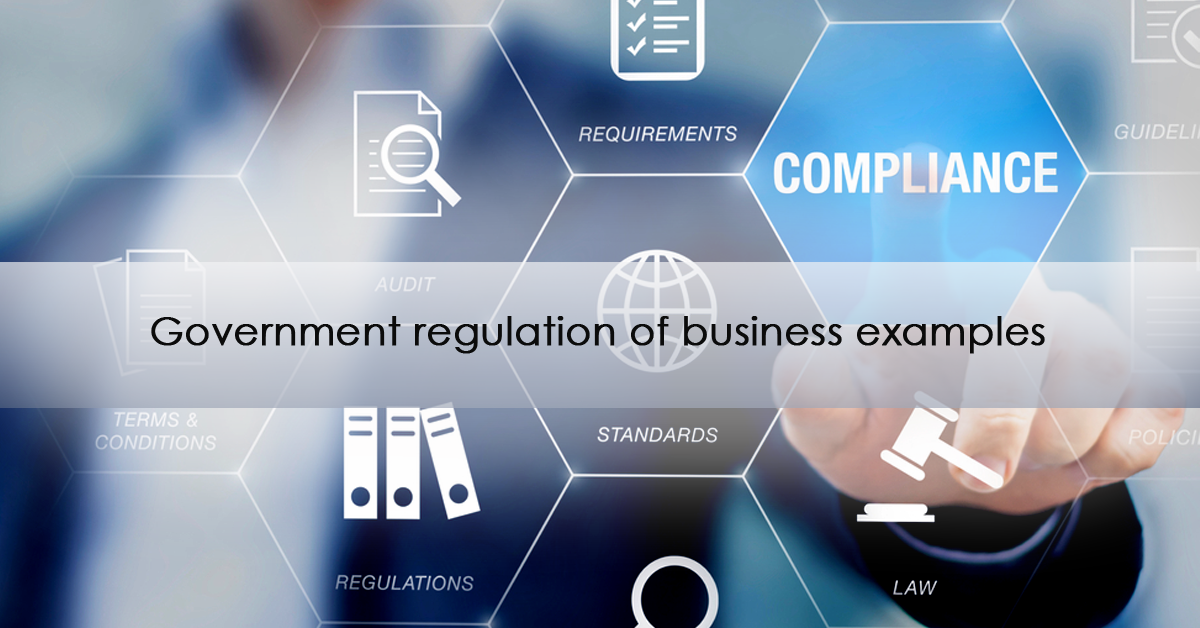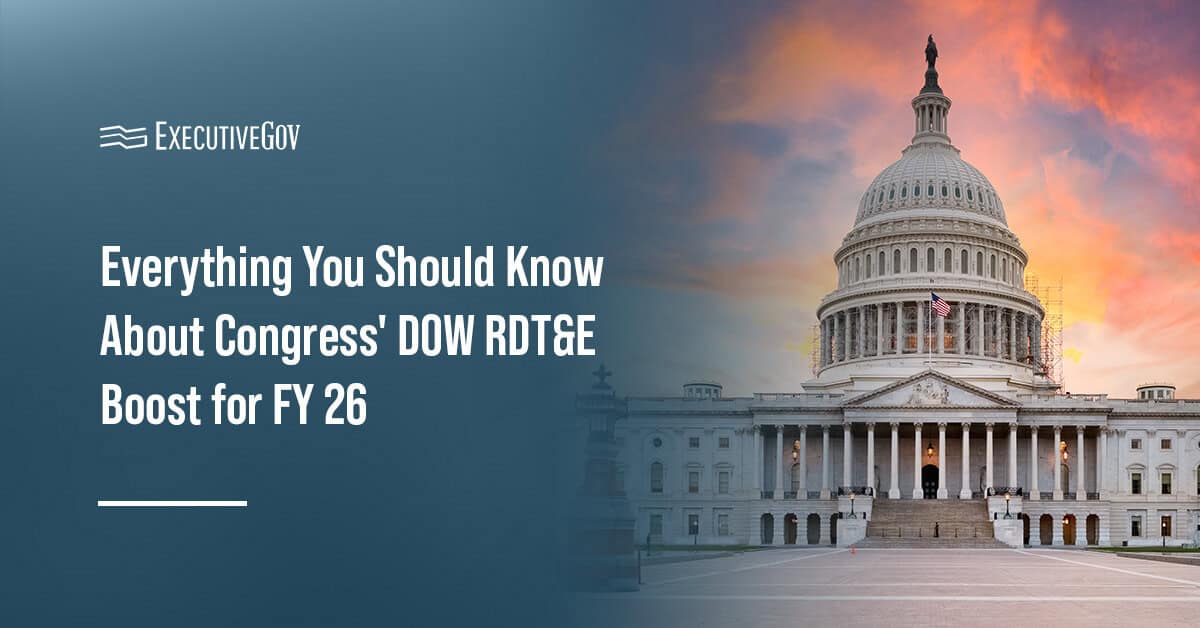Government regulation of businesses is a practice that has existed in the United States as long as there are commercial activities to oversee.
Federal regulations and laws can be put in place through legislative acts that can control entire industries, or they can be applied case by case to the business operations of owners. The function of these regulations is to promote the public health, safety, welfare, and morals of its constituents.
This post aims to highlight and provide examples of government regulations that impact business owners and how to deal with them.
Table of Contents
How are government business regulations made?

The process of making regulations is complex. It starts with a proposal from an agency, which may be prompted by a law passed by Congress or another action taken by the executive branch. The proposal then goes through several steps, including:
Step 1. Public comment period
People who are affected by the proposed rule have an opportunity to comment on it during this stage. Their comments are used to shape the final version of the rule.
Step 2. Notice of proposed rulemaking
This document describes what types of comments will be accepted and how they should be submitted during public comment periods. It also explains why the rule is needed and its effect on businesses, consumers, and other groups affected by it.
Step 3. Drafting
A draft must be written that reflects any comments received during the public hearings or written comments submitted during previous review stages. The draft is further modified based on new information during its drafting process.
What are the purposes of business regulations by the government?
1. Government business regulations are federal laws and statutes passed to protect businesses and the public interest. These regulations can be used by small businesses to help them grow. For example, government regulations may require using certain safety equipment on the job site if you own a construction company.
2. Federal regulations also affect how local businesses operate by setting standards for employee safety, health care, and environmental rules. For example, state licensing laws may require you to have some insurance for your employees if they get injured while using dangerous equipment at work.
3. Small business regulations can help maximize public safety and quality, vital for attracting new customers who want to feel safe when purchasing goods or services from their business.
4. Lastly, these regulations protect consumers from fraud and poor service by requiring businesses to follow specific guidelines when doing business with consumers.
Government regulation of business examples

Companies have always had to comply with government regulations. However, there has been a growing trend toward increased government regulation of business practices in recent years. This is due to the rise of globalization, which means that today businesses operate on a global scale and within countries. The top 5 government regulation examples are listed here:
1. Taxes
The government regulates businesses by taxing them. The tax rate is the percentage that companies must pay to the state and local governments based on their entity (sole proprietorship or limited liability company), size, location, and industry they are involved. The higher the tax rate, the more money the government takes from companies.
However, the federal government offer tax incentives for businesses that partner with minority- and women-owned business and those who hire new employees and create jobs in some areas. There are also general taxes that business owners pay regardless of their structure:
- Excise tax is one of the most common types of tax levied by the federal government. This also applies to specific goods or services such as gasoline, alcohol, and tobacco. This can also be done by passing along the tax cost to consumers in the form of higher prices. The IRS has a dedicated explanation of what constitutes an excise tax.
- Employment taxes are the taxes that employers pay on behalf of their employees. These include the employer’s share of Social Security and Medicare taxes, federal and state unemployment insurance, and federal and state income tax withholding. See the IRS page, Employment Taxes for Small Businesses, for more details.
- Income taxes – Every business, excluding partnerships, must file its annual income tax returns. This is the tax of entities or individuals based on their earnings.
- Estimated tax – This tax payment gives companies an alternative to paying their income tax as their company earns income throughout the year.
- Self-employment tax involves Social Security and Medicare tax primarily for individuals who work for themselves.
- State tax is imposed on people in the state and business organizations who own properties like land, vehicles, and buildings.
2. Federal antitrust laws
The federal law helps keep the competition in the marketplace by giving them incentives to maintain the product quality while keeping prices at the desired range. This is beneficial for consumers because they can get the most valuable products and get value for money. Further, states may impose more antitrust laws based on federal statutes.
These include banning business operations such as :
1. Different companies forming a monopoly by forming mergers and acquisitions to minimize competition.
2. Businesses conspiring with other business owners to fix prices and divide markets.
3. Businesses using competitive and unfair strategies meant to deceive consumers.
3. Health and safety
The most popular safety and health regulation in the workplace are The Occupational Safety and Health Act of 1970. Their objectives are to ensure that employers provide their workers with a working environment free from harm and hazards such as:
- Exposure to toxic elements
- Excessive noise levels
- Mechanical dangers
- Cold and heat stress
- Unsanitary surroundings
Moreover, the health act gave rise to two federal agencies, the National Institute for Occupational Safety and Health and the Occupational Safety and Health Administration. To learn more about regulations in different sectors, visit the EPA website.
4. Pay equity
The Equal Pay Act is a law that prohibits employers from paying unequal wages to women and men with jobs that require substantially equal skill, effort, and responsibility under similar working conditions. It also prohibits retaliation against employees for inquiring about, discussing, or disclosing their wages or the wages of other employees.
There has also been recent legislation at the local and state levels to address this gap in pay equity. An example is when New York City passed a law against wage disclosure. However, its effectivity was postponed to later in Nov 2022. This will also mandate job postings to include the minimum and maximum wage with penalties for employers who don’t comply with the law.
Here’s a list of other state laws under general provisions:
- California – Applicants can inquire about the hourly range after the job interview.
- Colorado – Employers should disclose the hourly rate in the job posting.
- Maryland – Salary range must be provided to applicants upon request after the application.
- Nevada – Applicants may request a wage or salary range after completion of an interview. Also, current employees may ask for this information after applying, interviewing, or receiving a promotion or transfer offer.
5. Retirement
In 2021, 68% of private industry workers had access to retirement plans. Passing the Setting Up Every Community for Retirement Enhancement (SECURE) Act in 2019 made retirement plans more easily accessible for everyone who plans to participate through pooled employer plans in January 2021. It helped small businesses in the private sector to take advantage of this.
How to conform to government regulations as a business owner?

The American government has imposed many business regulations to protect the environment and employees’ rights. These regulations hold corporations responsible for their power in a business-driven community. So, if you want to keep your business running smoothly, it’s best to comply with all government and local regulations to avoid getting into problems.
1. Tax regulation
The IRS needs to know the whereabouts and operations of companies. So, business owners should work on their file form SS-4 IRS business registration.
Sole proprietors without employees may not need an SS-4 form. After accomplishing the form, owners will get an employer’s kit stating the details about owned taxes, deadline of payment, place of payment, and amount computation.
Also, business owners will be given an employer’s identification number (EIN). In the case of sole proprietors, they will use their Social Security number for business identification purposes.
The EIN is needed for the following:
- Communicating with government agencies
- Opening business accounts
- Opening brokerage accounts
- Dealing with other people responsible for reporting business actions to federal government agencies
Next, if the business has employees, it must withhold portions of its employees’ earnings and help with the employer’s share. Applicable regulations relating to withholding wages are strict, and failure to do so can bring government action.
At present, at least two cities and 14 states have complied with the retirement savings legislation. For example:
- New York City has enacted savings programs
- California and Oregan have passed Roth IRA programs
- Vermont started the Green Mountain Secure Retirement plan for multiple employers
2. Land use regulation
Land use regulation is a set of laws and rules that control what can be built on or near a piece of property. These laws are designed to protect people’s health and safety in the area around your property.
Land use regulations are usually enforced by local governments like city councils, county boards, or planning commissions. These local bodies have the power to enforce zoning ordinances, building codes, and other regulations. They also sometimes require businesses to contain permits before building or expanding their facilities.
Most land use regulations aim to preserve open space and prevent pollution from industrial activities. Local governments are also interested in stopping developers from bulldozing neighborhoods to build more business in those areas.
3. Building and fire codes
In most cases, local building codes apply to all properties in a given area, whether they’re commercial or residential. They are enforced by your local government and cover structural integrity, electrical safety, and fire safety. Building codes vary from one city or county to another.
Fire codes regulate how buildings should be built so they don’t catch fire easily and allow firefighters to access the building and put out fires quickly. Additionally, the fire department must know if you are operating on something that can cause fire or chemical hazards and if there are enough fire extinguishers and equipment preset for fire-retardant purposes.
Tips to easily comply with business regulations
If you are still worried about the rigidity of these regulations, there is no need to panic. You can easily conform to them as well as the new and relevant regulations by following these simple tips:
1. Hire a compliance officer
This person’s job is to ensure all standards are met and maintained at all times. They also ensure that everyone in the company knows their responsibilities. In addition, they make sure the right policies and procedures are in place so everyone can access them quickly.
2. Create an internal audit program
Here, you can regularly check how well your policies are working and if there are any areas needing improvement.
3. Have well-oriented employees
Ensure all employees know how to handle sensitive information, such as customer data, credit card numbers, etc., so they don’t leave confidential information lying around where anyone with access could find it.
4. Review your insurance policies
You have to make sure the coverage you need for any liability claims that may come up due to employee negligence or other causes like server failure can serve you.
Which agencies help with business regulations?

The business regulations governing a company are not only complex but also constantly changing. So, it’s essential to stay updated on these regulations. Here are some agencies that help with their regulatory compliance:
1. The Food and Drug Administration (FDA)
The FDA was founded in 1906 under president Theodore Roosevelt. It is an agency that oversees foods, drugs, and medical supplies. It’s in charge of protecting and promoting public health through regulation and supervision of:
- Food safety
- Tobacco products
- Dietary supplements
- Prescription and over-the-counter drugs
- Vaccines
- Pharmaceuticals
- Cosmetics
- Veterinary products
- Radiation-emitting devices
It presents drawbacks to pharmaceutical companies because awaiting FDA approval and marketing of drugs can cause delays due to the demand for further and more rigorous clinical trials, which have already proven their safety and effectiveness.
This can significantly affect patients immediately needing treatment and access to certain drugs. Also, it can be costly to get approval, which is the main reason stopping small firms from entering the market.
2. The Environmental Protection Agency (EPA)
EPA is an agency responsible for protecting human health and the environment by overseeing the following:
- Disposal of waste
- Controlling other pollutants
- Applying greenhouse emission restrictions
Moreover, EPA is responsible for ensuring businesses comply with all environmental regulations and laws, including the Clean Water Act and the Clean Air Act.
3. The Securities and Exchange Commission (SEC)
SEC was created in 1934 by Congress, with commissioners appointed by the U.S. president as advised by the Senate. It’s a federal agency responsible for protecting investors, maintaining fair and orderly markets, and facilitating capital formation.
4. The Federal Trade Commission (FTC)
The FTC promotes consumer protection for U.S. residents and businesses. Its mission is to protect consumers from unfair or deceptive business practices and advance competition’s interests in the marketplace.
It also enforces laws to prevent businesses from engaging in anti-competitive practices such as price-fixing, collusion, and other illegal agreements between competitors. This includes the antitrust laws prohibiting mergers and acquisitions that would substantially reduce competition and lead to monopolies.
The FTC can investigate companies for violations of these laws and recommend action by the Department of Justice. It will decide if the company needs prosecution for an antitrust violation and may seek civil penalties against them in the federal court.
5. Sarbanes-Oxley
Sarbanes-Oxley is not an agency but an act. The Sarbanes-Oxley Act was passed in 2002 after the Enron Scandal, where corporate executives were found guilty of manipulating their companies’ financial statements, which led to investors losing billions. The law was designed to prevent such scandals by creating stricter criteria for auditors performing financial management.





